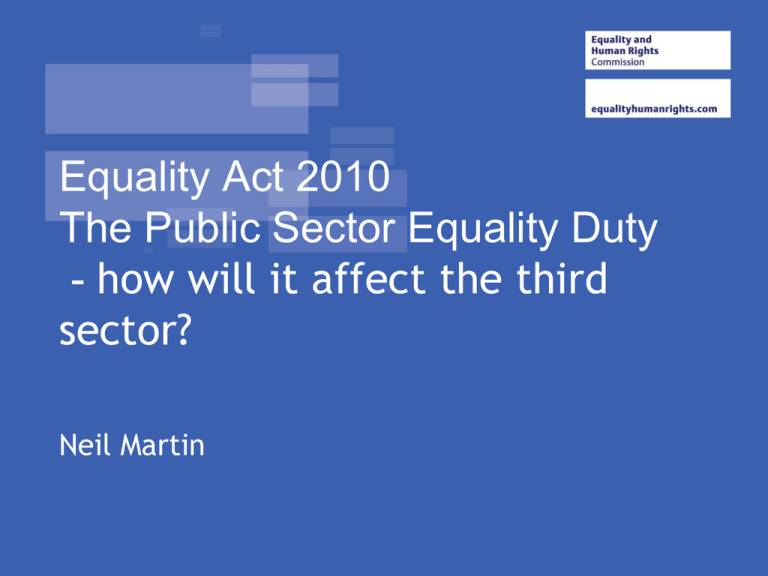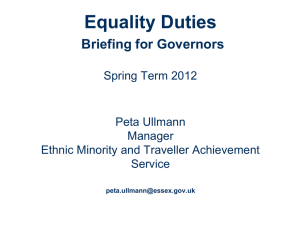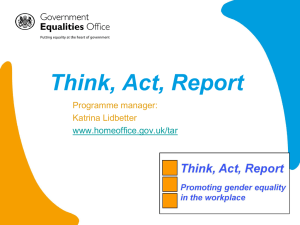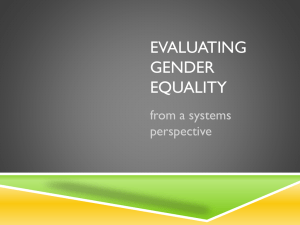
Equality Act 2010
The Public Sector Equality Duty
- how will it affect the third
sector?
Neil Martin
Key provisions
October 2010:
Services & Public Functions
Premises
Employment
Associations
Education
April 6th 2011: Public Sector Equality Duty
4/13/2015
2
Protected Characteristics
services, public functions, employment
•
•
•
•
•
•
•
Disability
Gender reassignment
Pregnancy & maternity
Race
Religion / belief
Sex
Sexual orientation
•
Marriage & civil partnership – employment &
vocational training
Age – from 2012
•
4/13/2015
3
Prohibited Conduct
1. Direct discrimination, including by association
and perception
2. Indirect discrimination
3. Harassment
4. Third party harassment
5. Discrimination arising from disability
6. Duty to make reasonable adjustments
4/13/2015
4
Purpose of the equality duty
Help public authorities to:
• Integrate equality & good relations into core business
(design of policies/delivery of services).
• Develop services more appropriate to users & more
cost-effective
• Increase productivity by building a more supportive
working environment
• Draw on a wider range of talent & be more
representative.
• Better informed decision-making & policy
development (improving policy outcomes &
satisfaction with services)
Protected characteristics
-Public Sector Equality Duty
•
•
•
•
•
Age
Disability
Pregnancy and maternity
Religion or belief
Race
•
•
•
•
Sex
Sexual orientation
Gender reassignment
Marriage and civil
partnerships (but only for
eliminating discrimination)
Key elements of the duty
•
•
•
•
Equality information
Engagement
Equality analysis
Equality objectives
Key dates for the duty in England
• 6 April 2011: general & specific duties come into force
• 31 July 2011: specific duties require listed bodies
(except schools) to publish equality information
• 31 December 2011: schools to publish equality
information
• 6 April 2012: specific duties require listed bodies
(including schools) to publish equality objectives
General equality duty
In the exercise of their functions, public authorities must
have due regard to the need to:
• Eliminate unlawful discrimination, harassment and
victimisation
• Advance equality of opportunity
• Foster good relations
What this means
Advancing equality:
• Remove or minimise disadvantages suffered by people
with protected characteristics
• Take steps to meet the needs of people from protected
groups (including taking account of a disability)
• Encourage protected groups to participate in public life.
Fostering good relations:
• Tackle prejudice
• Promote understanding
Who the general duty applies to
• Public authorities listed in Schedule 19 of Act
– e.g. local authorities, schools, health bodies, police
& government departments).
• Organisations who exercise public functions
– e.g. private/voluntary organisations carrying out
public functions on behalf of a public authority.
Commissioning and procurement
• General duty will apply to procurement &
commissioning by public authorities regardless of the
value of the contract.
• No specific duty relating to procurement.
• Commission planning to publish a guide to equality and
procurement – spring / summer 2011.
Specific duties
• Purpose is to help public authorities to comply with
the general equality duty
• Complying with the specific duties is part of
complying with the general equality duty, but is not
sufficient in itself
Who the specific duties apply to
• The specific duties apply to all public authorities
listed in Schedule 1 of the specific duties
regulations.
• This covers most (but not all) of the public
authorities listed in Schedule 19 of the Equality Act.
Equality information
• Under specific duties, publish sufficient information to
demonstrate their compliance with the general equality
duty (at least annually)
• Public authorities with under 150 employees:
– not required to publish workforce information
– need to collect workforce information for developing
objectives & equality analysis of workforce policies.
Sensitive equality information
• Where employees & service users are not ready to be
asked about sexual orientation, gender reassignment or
religion, develop a culture of trust to enable this to be
collected in the future.
• Explain why information is being collected, what it will
be used for, and how privacy will be protected.
• Analysing national or local research and engagement
are useful for identifying key issues if monitoring is not
possible.
Engagement
• General duty requires public authorities to have a good
evidence base for decision-making, and engagement is
a key part of that information.
• Specific duties require information about engagement
undertaken to be published, including when developing
equality objectives.
• Specific duties don’t set out how or when engagement
should be undertaken.
Equality Analysis
• A key part of complying with general duty.
• Specific duties require publication of evidence of equality
analysis undertaken and details of the information
considered.
• Case law on the old duties still has relevance.
– e.g. equality analysis needs to be undertaken before
decision-making and written records are needed.
• Current duties still apply until 6th April
Equality objectives
Authorities covered by the specific duties:
• Prepare and publish equality objectives.
• Publish objectives at least every 4 years (either
individually or as part of another document).
• Consider the equality information that was published,
before preparing equality objectives.
• Objectives must be specific and measureable
• Publish details of engagement undertaken when
developing equality objectives.
• Set out how progress on objectives will be measured.
Specific duties
1) Publish equality information:
• Publish sufficient information to demonstrate
compliance with the general equality duty by 31 July
2011 (31 December 2011 for schools), then annually.
• Publish this in an accessible manner
This shall include:
• The effect of policies on protected groups
• Evidence of equality analysis
• Details of information considered in equality analysis.
• Details of engagement undertaken
Specific duties
2) Prepare and publish equality objectives
• Prepare & publish objectives to meet one or more
aims of general duty by April 2012
• Publish new objectives at least every four years
• Consider the published equality information before
preparing objectives.
• Publish details of engagement undertaken when
developing objectives
• Ensure the objectives are specific and measureable
• Set out how progress on objectives will be measured.
Monitoring and enforcement
• Commission responsible for monitoring and enforcing the
equality duty
• Range of tools set out for the Commission under the
Equality Act 2006 still apply
• Enforcement tools include:
– compliance notices
– judicial review
– section 31 assessments
– section 23 agreements
– legal interventions.
Guidance
Codes of Practice
• Employment
• Services, Public Functions and Associations
• Equal Pay
• Public Sector Equality Duties
Non-Statutory Guidance
• For employers and workers
• For service providers and for service users
• Public Sector Equality Duties
Equality Act starter kit
4/13/2015
23
PSED Guidance
Available now:
• The essential guide to the public sector equality duty
• Equality analysis and the equality duty
• Engagement and the equality duty
• Equality objectives and the equality duty
• Equality information and the equality duty
To be produced:
• VCS specific guidance - Equality & Diversity Forum
• Code of Practice
Advice & Guidance
• Website: www.equalityhumanrights.com
• EHRC Helpline:
– Tel: 0845 6046610
– Email: englandhelpline@equalityhumanrights.com
• Government Equalities Office: www.equalities.gov.uk










